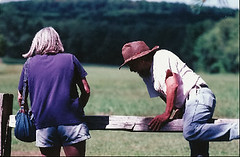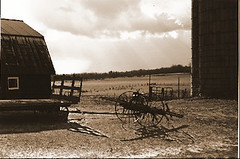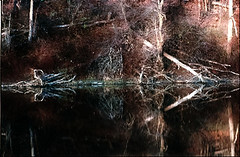City Lights (1931)
Dir. Charlie Chaplin
Writ. Charlie Chaplin, Harry Clive (uncredited)
w/ Virginia Cherrill, Florence Lee, Harry Myers, Charles Chaplin
Many films from the thirties have a difficult time translating into the minds of the so-called generations X and Y, MTV babies who don't see the point of watching something that isn't run on a loop of just seconds before the next bit of scenery intervenes to ensure that, no matter what, they don't get bored by actually having to think or absorb something fully. Whatever criteria needs to gain popularity to change this in any tangible way the world may never know, but certain films from the dim days of the silent era are gems that need only be noticed, rented, and popped into the DVD player to be fully enjoyed and thereby rediscovered.
Chaplin shot footage for a reported 180 days, but his distilling of City Lights over a three year span remains a beauty of an example of patience winning over hurried production simply for the sake of producing. In light of certain personal aspects of the eccentric artist's life, it may also be of interest to note the heady preoccupation with chance and circumstance inherent in the film. This reflection of the deliberation in the making of City Lights gives the scenes an extra layer of lens depth discernable to anyone not immune to Chaplin's magnificent sense of the world.
It's a world where a blind flower girl and a millionaire who forgets his station simply exist, and he does what he can to enjoy their company by saving her from eviction and him from suicide. His mattter of fact manner perhaps his most charming attribute, his life is beset by trials and joys as he sets about the business of acting as breadwinner by day and dubious friend to his drunken, rich acquaintance at night. That the millionaire only remembers that the Tramp is his long, lost savior when he is drunk is marvelous. But it his simple, undaunted sincerity in his loyalty to these two that lifts the spirit of the film above the sidewalks the Tramp strolls in his daily wanderings, never more than half a frame away from his next adventure.
And adventure it is, in the honest, traditional sense of the word. The Tramp's lonerism is a pure and vital foundation of the story. As the antics end, he continues on his way, disheartened at his seeming failure but still true to himself. When he finally does amble back into the flower girl's life, in a city where even politicians' worst noise can't taint the magical proof of time served in a love rediscovered, it's the most natural thing you ever did see.
Chaplin shot footage for a reported 180 days, but his distilling of City Lights over a three year span remains a beauty of an example of patience winning over hurried production simply for the sake of producing. In light of certain personal aspects of the eccentric artist's life, it may also be of interest to note the heady preoccupation with chance and circumstance inherent in the film. This reflection of the deliberation in the making of City Lights gives the scenes an extra layer of lens depth discernable to anyone not immune to Chaplin's magnificent sense of the world.
It's a world where a blind flower girl and a millionaire who forgets his station simply exist, and he does what he can to enjoy their company by saving her from eviction and him from suicide. His mattter of fact manner perhaps his most charming attribute, his life is beset by trials and joys as he sets about the business of acting as breadwinner by day and dubious friend to his drunken, rich acquaintance at night. That the millionaire only remembers that the Tramp is his long, lost savior when he is drunk is marvelous. But it his simple, undaunted sincerity in his loyalty to these two that lifts the spirit of the film above the sidewalks the Tramp strolls in his daily wanderings, never more than half a frame away from his next adventure.
And adventure it is, in the honest, traditional sense of the word. The Tramp's lonerism is a pure and vital foundation of the story. As the antics end, he continues on his way, disheartened at his seeming failure but still true to himself. When he finally does amble back into the flower girl's life, in a city where even politicians' worst noise can't taint the magical proof of time served in a love rediscovered, it's the most natural thing you ever did see.















0 Comments:
Post a Comment
<< Home